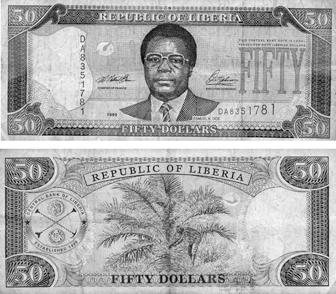
The IMF Advises Liberia against Quick Fixed Solution to Liberia’s Economic Problems
By Winsley S. Nanka, CPA
Wnanka@theperspective.org
The Perspective
Atlanta, Georgia
April 4, 2005
 |
|
Liberian Currency
|
Liberia has a long history of bi-monetary currency system. The U.S. currency was declared the official currency of Liberia in 1943, replacing the British West African currency (WWW.GlobalSecurity.Org). However, there is evidence that as far back as 1926, the American currency was used in Liberia alongside the British West African currency.
The IMF’s comments were made at the fourth consultative meeting between the Liberian government and the Fund on February 25, 2005 in Accra, Ghana. According to the draft report, the IMF statement came in reaction to suggestions by some Liberian government officials at the consultative meeting indicating the need to fully use the U.S. dollar as a way to “reestablish fiscal discipline”. The Liberian government officials at the conference suggested the full use of the U.S. dollar in Liberia could contribute towards attracting and retaining foreign investments in Liberia. The Liberian government officials also told the IMF that the use of the U.S. dollar could help reduce wage inflation, and contribute toward “active monetary policies”.
The IMF believes the full use of the United States dollar in Liberia will not be in the best interest of the country at this time because of the follow factors: (a) The Liberian economy is primarily dependent on commodity export; therefore, any volatility in the commodity prices could adversely affect the country; (b) The full use of the U. S. dollar in Liberia would be expensive to implement because of the volume of U. S. dollar needed; (c) The Liberian banking system would need to stock more dollars to meet the demands on the currency in the case of dollarization; (d) The use of the U.S. dollar would not stop the Liberian government from running budget deficits; and (e) Market in-balances are better resolved by the introduction of competition in the market place rather than the use of the American dollar.
The IMF further informed the Liberian government officials at the consultative meeting that foreign investors are more likely to invest in Liberia because of “political and social stability, a healthy and productive work force, and a functioning infrastructure” and not because of the use of an internationally accepted currency.
In the past, other countries have adopted dollarization as a solution to their economic and political problems. In 1999, Argentina sought an agreement with the United States to formally use the U.S. green back as its official currency, and in 2000, Ecuador’s president proposed the use of the American currency as the solution to the economic and political problems that engulfed that country.
Meanwhile, in a scathing rebuke of the Liberian government’s handling of fiscal matters, the draft report says the Liberian government “provided insufficiently detailed information to allow the IMF to make comparison between budget provisions, allocations and disbursements for the first half of the 2004/2005 fiscal year”. Simply put, the Liberian government’s records keeping was so inefficient that the IMF’s officials could not tell how the Liberian government collected and spent money during the budgetary period. The report also says the IMF is disturbed by the failure of the Liberian government to meet its expenditure obligations as evidenced by “the emergence of sizable [budgetary] arrears. In view of this, the IMF doubts if the Liberian government could “implement the approved budget without jeopardizing its overall objectives and structure”.
This is not the first time the IMF has condemned the interim government for fiscal in-discipline. On March 25, 2004, the IMF released a report on Liberia in which the world financial body criticized the Liberian government for excessive and uncontrolled spending.
On a positive note, the draft report says real GDP which is the measure of the dollar value of goods and services produce by an economy using a base year prices is expected to grow by 8.5 per cent in 2005. The growth in real GDP is mainly due to the growth of the agricultural sector, fueled by rubber production; manufacturing, services, donor activities and the United Nations massive presence in Liberia.
